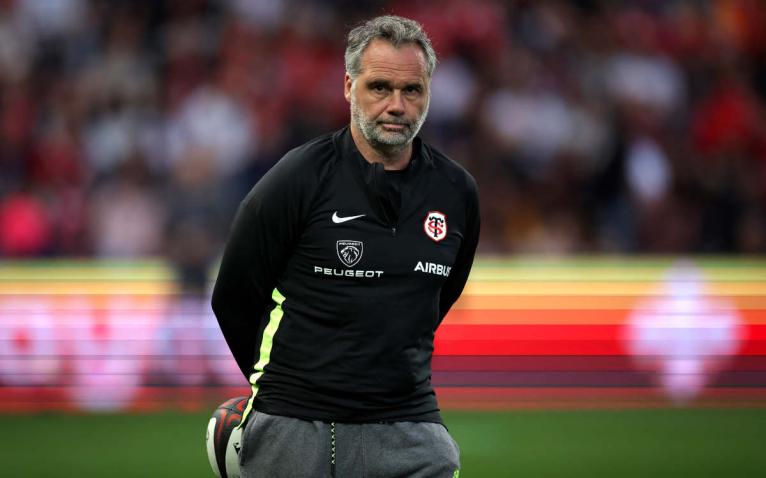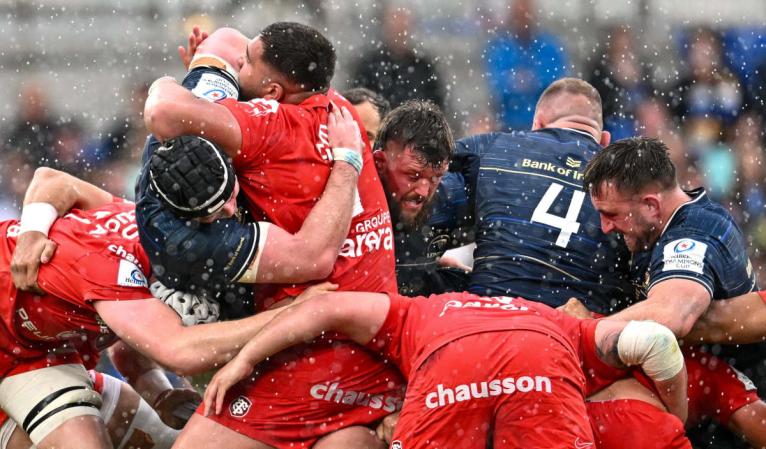The giant screens were already being erected midweek in the Place du Capitole where an array of Stade Toulousain shirts and banners billowed in the unseasonal tempestuous weather. It would take more than a downpour, though, to dampen the mood in La Ville Rose as their team packs its bags to head to London and Saturday’s date with destiny at the Tottenham Hotspur Stadium against Leinster, the all-star (five to Toulouse, four to Leinster) shoot-out to determine the Champions Cup winners. There is no sign that the people of Toulouse are sated with their team’s success – 22 Bouclier des Brennus, ten in the professional era, the trophy-engraving expert kept busy with the addition of five European Cup titles. In a vintage shop in Rue Peyrolieres the (female) owner waxed lyrical about ‘their boys, their sons, the Toulouse family, the passing of the baton from one era to the next,’ with each iteration loved and admired for what they represent. You don’t travel far in the city without coming across the Rouge et Noir livery. It has long been this way.
And this generation are well aware of their responsibilities, in the Top 14 for that is a tribal affair through towns and cities and departments, but also in Europe. Stade Toulousain had a cross-border vision long before anyone else.
“This competition makes you dream and leaves a mark on you,” full-back Thomas Ramos told Midi Olympique in a wide-ranging interview. “Our team wants to meet the challenge (of Leinster) and make history. We want to be worthy of the stars on the jersey.”

The final is a showcase event, fittingly so in such a state-of-the-art venue, a vivid backdrop for two sides who continue to reset and move with modern times. They share a storied history albeit Stade Toulousain’s is deeper. These are the two most decorated sides in Europe, having featured in 14 of the 29 finals. That Toulouse were first out of the blocks when beating Cardiff in the inaugural final in 1996 was little surprise given that they had always operated to professional standards long before ‘professional’ equated to being paid for the job.
They had an aura even back then, a sense of style, an enterprise dedicated to the business of winning but in a certain manner, one that would thrill as well as deliver. There was a magnetism about them, an ability to perform alchemy on the rugby field. Why, they even managed to turn Rob Andrew, the English Roundhead to Stuart Barnes’s Cavalier, into a free-running, free-spirited fly-half when he played for them in the early nineties.
There is a heart and soul to Stade Toulousain, a sense of swagger and aristocracy but one which is wholly in touch with le terroir of the region, earthy as well as ethereal.
There is a heart and soul to Stade Toulousain, a sense of swagger and aristocracy but one which is wholly in touch with le terroir of the region, earthy as well as ethereal. The club had its own Michelin-starred eatery in the grounds of Sept Deniers and currently host Le Grand Café du Stade in the centre of the city, its walls stacked with memorabilia. But for all the rock-star glitz of the set-up, this is not a galactico club in the way that a Manchester City or Real Madrid is. Stade Toulousain is built on Anfield Boot Room foundations, far more so than even the Merseyside football club managed. There is a Toulouse way, on and off the field, with only those who have played for the club acceding to the top positions.
Long-serving president, Rene Bouscatel, has given way to Didier Lacroix while there have only been two head coaches in the pro era, both also former players, Guy Noves, that small, fretful, crouched figure on the touchline that oversaw such success (1993-2015) and now former wing, Ugo Mola, a winner from the bench in 1996 and head coach when the Champions Cup was won three years ago. (The star quality of the final extends off-field as well with Mola’s opposite number, Leo Cullen, also a winner as player and coach).

The Stade Toulousain DNA is a cultivated thing. Much as Johan Cruyff infused modern football with his Total Football philosophy so former Toulouse and France full-back, Pierre Villepreux was responsible for inculcating a similar outlook at Stade Toulousain, not a devil-may-care approach where the ball is flung about without thought or jeopardy but a way of playing that encourages initiative and cleverness and calculated risk. That credo is still in place as Toulouse’s record this season illustrates. Their average winning margin in the Champions Cup is 25 points while they are three points clear in the Top 14 with a points scoring (706) tally in 24 matches way ahead of the next best, Toulon. Stade Toulousain also have the best attacking bonus point haul in the league.
Stade Toulousain are not without their imperfections and vulnerabilities. Their template is not bomb-proof. In fact, it’s possible to argue that given their head-start in the professional era they ought to have won even more than they have.
But enough of the romance and the frills and the ‘jouez, jouez,’ cries. To see the team as mere troubadours, entertainers with their gaudy, giddy ways, is to do them a massive disservice. The pleasure in watching them perform down the years has been to relish the grunt and graft of their forward pack as much as it has been to gasp at their counter-attack from deep. Warriors such as Fabien Pelous, Patricio Albacete, Jean Bouilhou and Christian Califano have been as central to the club’s success as have the likes of Emile Ntamack, Yannick Jauzion, Frederic Michalak and Vincent Clerc. The same is true today. Cyrille Baille, Francois Cros and Thibaud Flament alongside their mates up front operating at the coal-face will be as instrumental to the outcome as an Antoine Dupont or Blair Kinghorn might be. Le combat is just as important as le flair.
Stade Toulousain are not without their imperfections and vulnerabilities. Their template is not bomb-proof. In fact, it’s possible to argue that given their head-start in the professional era they ought to have won even more than they have but that, of course, would be to discredit their rivals. But they have managed to keep their noses in front and they have managed to come through a slump without completely falling apart. The last decade, the 2010s, was their worst in a long, long time with a barren stretch between 2012-2019. Their rugby became lumpen and uninspiring. Even their renowned business model, with its portfolio of backers and local sponsors, took a hit.

But order has been restored in the Stade Toulousain firmament. A generation dorée (golden generation) has come through the Academy ranks and Antoine Dupont (signed by Mola from Castres) is within. There is a “calm and serenity” about the club as it prepares for the final. “We know how to play these matches,” continues Ramos.
Leinster, twice recent semi-final victors over Stade Toulousain, trade on pretty much equal terms, on the field and up in the stands. It’s a box-office final all right.


If it comes down to who wins on goal kicks, I’d be fearing Toulouse. They got the man there by a fair margin !
So hard to call, it's going to be a cracker.